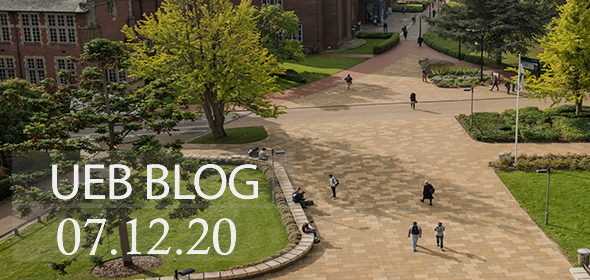Author: Shaun Williams, Executive Director Engagement and Advancement

In Gold Command mode UEB discussed a number of operational campus issues:
- There was a discussion about our response to the Government’s guidance on a staggered return of students for face-to-face teaching in January, which was published last week. It is expected this will largely be achieved through the natural phasing that will result from the existing timetable and the nature of the planned face-to-face teaching assessments scheduled through January. Detailed guidance will be provided to students and staff over the coming days. Our pragmatic approach is also based on consultation with our local public health bodies, and underpinned by providing returning students with continued regular testing through our saliva-based Southampton Testing Programme.
- Based on its assessment of the current University and local context, which has seen an overall reduction in the number of active cases over the last week and with many students already returned home, and after discussions with local public health bodies, UEB confirmed that the University will remain at Tier 1 in terms of the Department for Education response levels. These DfE tiers are completely separate from the new tier levels introduced in England last week.
The meeting then reverted to normal UEB mode for the rest of the agenda, which this week focused primarily on our Strategic Major Projects:
- UEB agreed a new Strategic Major Project should be set up to co-ordinate across all our strategies and major projects the opportunities that have emerged during the COVID pandemic of new ways of working and learning for our staff and students. As thoughts turn in the New Year to a gradual return to normality later in the year once the vaccinations have been rolled out, we must ensure we seize the opportunities that have emerged through the massive forced shift in working and studying, rather than simply return to a pre-COVID “normal.”
- This potentially offers huge opportunities for increasing flexibility and choice for our staff and students, with potentially a different blend of home and campus working and learning in the future. It means we may need to take a different approach to how we use and equip our buildings, and re-appraise the shape of the long-term estates strategy which is currently being developed. It also provides us with a tremendous opportunity to start to deliver on the ambitious goals of our Sustainability Strategy and reduce our carbon footprint, as we consider alongside the City Council a new approach to transport, as well as our own approach to domestic and international travel, and to our operations and procurement.
- UEB was briefed on two potential future estates projects. Firstly, an update on emerging thinking around the future development of the Nuffield Theatre and our commitment to deliver a multi-functional arts performance space for our students, staff and the local community. Secondly, an update on emerging plans for a new Medical and Health Research facility that could bring together key research strengths to address global societal health challenges over the next 20-30 years, placing Southampton at the forefront of this field, building on our interdisciplinary, innovative and entrepreneurial successes highlighted so dramatically during the past year. Subject to approval by the Planning and Resources Group, these two projects will now move to the scoping phase where specific ideas are designed and costed and the full vision is developed.
- A new Medical and Health Research building could form the centre-piece of the Campaign for Southampton, the University’s first comprehensive fundraising and engagement campaign, with an ambition to raise £100M and achieve 100,000 volunteering hours over the next ten years. UEB was updated by the Director of Development & Alumni Relations on the complex ground-work being laid for the Campaign. The first meeting of the Campaign Leadership Group, chaired by the Vice-Chancellor, recently took place. This group is charged with delivering the campaign, overseeing the strategy, and encouraging a culture of philanthropy across the University. Over the next twelve months the ‘case for support’ for the campaign’s lead projects will be developed and tested with donors, and there will be increased activities to engage and connect with our 250,000 strong alumni and supporter community.